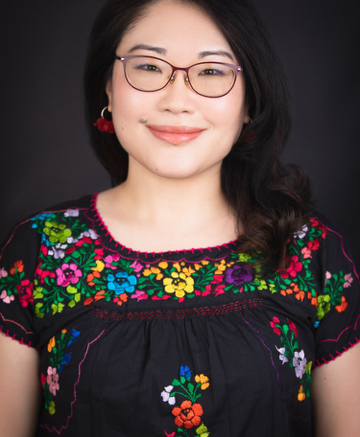“Research is meant to open doors to inquiry, not shut them—or particular individuals who supposedly do not belong—out,” said literary scholar Nancy Kang. Currently, she is an associate professor in the U of M’s women’s and gender studies program, Canada Research Chair in Transnational Feminisms and Gender-Based Violence, and acting director of the U of M’s Centre for Creative Writing and Oral Culture.
This philosophy of openness underpins Kang’s recent work that critically examines the consequences of racial homogenization within the U.S., particularly concerning Latinx communities (those of Latin American ancestry).
Kang specializes in ethnic North American literature, primarily of the twentieth and twenty-first centuries. At its core, Kang’s work is about breaking silences—whether historical, political, or personal, and creating room for stories that have long been pushed to the margins. “I want to ensure historical silencing, neglect and diminishment of marginalized populations do not continue without awareness, examination and contestation,” she said.
She is co-editing a new book with Michael Nieto Garcia, a professor of literature at Clarkson University. The book, Problematic Paradigms and the Contours of US Latinidad, brings together essays by Dominican-American English language professor Silvio Torres-Saillant that interrogate broad narratives of racial and ethnic belonging. A central focus of the book includes “the difficulties involved in defining a ‘Latinx community,’” given its internal diversity across over 65 million people.
Kang noted Latinx identity is not a singular experience but rather shaped by national origin, culture, language and legal status—variables often erased in mainstream representations.
“In terms of the homogenization of Latinx peoples […] In the U.S., it is precarious at this time to equate everyone who seems to fall into that identity category as the same in terms of legitimacy, citizenship, political orientation and civic belonging,” she explained. “More simply, clumping everyone together as a ‘community’ erases key differences, whether based on national origins, immigration status, ethnicity, culture and language use (among others).”
The essays also address the limitations of racial categorization in the U.S., particularly given the historical mixing of cultures and ethnicities in Latin America.
Highlighting the marginalization of Afro-Latinx individuals, Kang pointed to the tendency of U.S. racial discourse to simplify complexity through “homogenizing and ‘easy’ labelling of mixed-race peoples.” Her research includes the impact of such simplifications, from media portrayals to community frictions among groups like Puerto Ricans, Dominicans, Central Americans and Chicanx/Mexican Americans.
Kang warned of the dangers in forming “huge conceptual communities” like “the Latino community, the Asian community, the Black community” through uncritical media discourse. “Too often, I feel, there is potential for abuse of the ‘shared view.’ Solidarity and political strategy-building are certainly factors to keep in mind, but members of a given community do not exist there without eventually asserting their differences,” she explained.
Drawing a parallel with Asian American history, Kang noted how “it was assumed during the early era that started with the quest for Gold Mountain that Chinese immigrants would […] eventually return to the Old Country and not make the U.S. or Canada their home.” This assumption made it easier, she argued, “for those who wanted them driven out to commit acts of […] racial violence against them.”
This complexity intensifies for individuals navigating mixed identities. “Those who are part of multiple communities (say Black and Latinx peoples) need to negotiate the demands from multiple fronts,” Kang observed.
“Torres-Saillant mentioned, for instance, being asked by an African American colleague back in the 1990s while serving in the English department of a satellite campus of the City University of New York, whether he felt more Hispanic or more Black […] How does a person of mixed ancestry ask—or answer—such a loaded, complex question in a satisfying and simple way?”
Kang’s other ongoing project explores patterns of ostracism faced by spiritual women, focusing on Latinas historically identified as ‘brujas’ (witches) and African American enslaved women known as conjurers, within highly dogmatic religious communities.
Findings from this project challenge contemporary feminist assumptions about community as being inherently nurturing. Rather than providing safety, increased community involvement often resulted in greater vulnerability to harm.
Kang encouraged researchers, especially students, to resist binaries, boxes and the pressures of “pigeon-holing.” She urged them instead to embrace collaborative research amid risks and insecurities.


